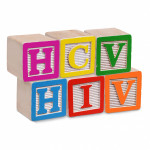A series of blood tests was nearly as accurate at predicting the progression of liver damage as liver biopsies in people coinfected with both HIV and hepatitis C virus (HCV), say the authors of a study published in the July 31 issue of AIDS. The high level of accuracy, the authors conclude, may reduce the number of liver biopsies in coinfected patients by 83 percent.
Currently, the gold standard for assessing the progression of liver damage, or fibrosis, caused by HCV infection is a liver biopsy. Unfortunately, biopsies are expensive, can be quite painful and carry the risk of internal bleeding.
To investigate whether a series of blood tests, or markers, may be as accurate as a biopsy, Daniel Suzman, MD, and his colleagues from the National Institutes of Health (NIH) in Bethesda, Maryland, studied 100 blood and biopsy samples from 68 people coinfected with HIV and HCV. Suzman’s team found that an eight-marker system—six blood tests combined with a person’s age and whether or not he or she has used antiretroviral (ARV) HIV therapy—correctly classified the stage of liver damage 88 percent of the time.
Suzman’s team also found that a four-marker system—all blood tests—was statistically equivalent to the eight-marker system. The authors caution, however, that their systems will need to be validated in larger clinical trials before being viewed as a replacement for liver biopsies.
Advertisement
Advertisement
Advertisement






1 Comment
1 Comment